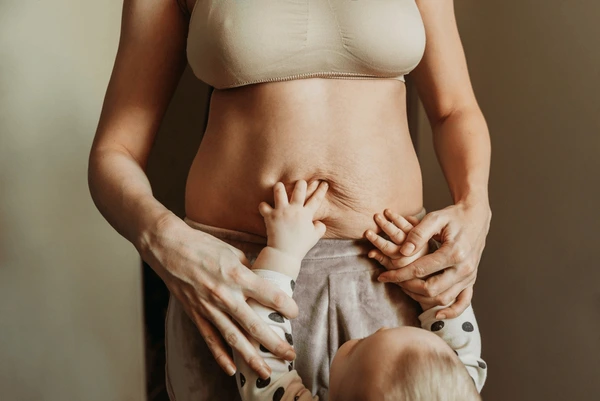Post-pregnancy, many mothers are eager to lose the weight gained during pregnancy. However, the focus should be on healthy, gradual weight loss, not crash diets. The body is still healing, and if you’re breastfeeding, your nutritional needs are even higher. So, see below the Post Pregnancy weight loss diet menu.
Nutritional Priorities After Childbirth:
| Nutrient | Why It’s Important | Best Sources |
|---|---|---|
| Protein | Muscle recovery, tissue repair, milk production | Eggs, chicken, dal, paneer, tofu, fish |
| Iron | Replenishes blood loss, combats fatigue | Spinach, dates, jaggery, red meat, lentils |
| Calcium | Bone health, milk production | Milk, curd, cheese, sesame seeds, ragi |
| Omega-3 Fats | Brain health, hormone balance | Walnuts, flaxseeds, fish, and chia seeds |
| Fiber | Prevents constipation, supports weight loss | Oats, fruits, vegetables, and whole grains |
| Fluids | Hydration, milk production | Water, buttermilk, coconut water, herbal teas |
Guidelines for Healthy Postpartum Weight Loss:
Prioritize Recovery Before Weight Loss:
Allow your body time to heal after childbirth. It’s generally recommended to wait at least 6–8 weeks postpartum before initiating any weight loss efforts, especially after a cesarean section. Always consult your healthcare provider before starting any weight loss plan.
Aim for Gradual Weight Loss:
A safe and sustainable weight loss rate is about 0.5 to 1 kg (1 to 2 pounds) per week. Rapid weight loss can negatively impact energy levels and, if breastfeeding, milk supply. Breastfeeding itself can aid in weight loss, as it burns approximately 500 extra calories per day.
Maintain a Balanced Diet:
Focus on a nutrient-rich diet that includes:
- Proteins: Lean meats, eggs, legumes, and dairy products
- Whole grains: Brown rice, oats, and whole wheat bread
- Fruits and vegetables: A variety of colors to ensure a range of nutrients
- Healthy fats: Nuts, seeds, avocados, and olive oil
Avoid processed foods, excessive sugars, and saturated fats. Eating 5 to 6 small meals throughout the day can help maintain energy levels and prevent overeating.
Stay Hydrated:
Drink plenty of fluids, especially water, to stay hydrated. This is particularly important if you’re breastfeeding, as it supports milk production. Aim for at least 8–12 cups of fluids daily.
Incorporate Physical Activity Gradually:
Once your healthcare provider gives the go-ahead, start with light exercises such as walking or postpartum yoga. Gradually increase the intensity based on your comfort and recovery progress. Regular physical activity can aid in weight loss and improve overall well-being.
Monitor Caloric Intake Carefully:
If you’re breastfeeding, ensure you’re consuming enough calories to support milk production—typically an additional 330 to 400 calories per day. Avoid restrictive diets that can compromise your health and milk supply.
Get Adequate Rest:
Sleep deprivation can hinder weight loss efforts and increase stress levels. While caring for a newborn can disrupt sleep patterns, try to rest when possible and seek support to manage fatigue.
Seek Professional Guidance:
Consult with healthcare providers, such as a registered dietitian or lactation consultant, to create a personalized plan that aligns with your health goals and lifestyle. They can provide tailored advice to ensure safe and effective weight loss postpartum.
Sample Post Pregnancy Weight Loss Diet Menu:
Early Morning (6:30–7:00 AM):
- Warm water with lemon
- 5 soaked almonds + 2 walnuts
Breakfast (8:00–9:00 AM):
- Vegetable upma or oats porridge with milk
- 1 boiled egg or paneer cubes
- Green tea or jeera water
Mid-Morning Snack (11:00 AM):
- Seasonal fruit (apple, papaya, or orange)
- A glass of coconut water or buttermilk
Lunch (1:00–2:00 PM):
- 1–2 multigrain rotis or brown rice
- Moong dal or chana curry
- Cooked vegetables (carrot, spinach, beans)
- Curd or raita
Evening Snack (4:30–5:00 PM):
- Roasted chana or makhana
- Herbal tea (like tulsi or ajwain)
Dinner (7:30–8:30 PM):
- Vegetable soup or quinoa salad
- Grilled paneer/tofu or boiled moong
- Light khichdi with ghee (1 tsp)
Before Bed (9:30–10:00 PM):
A glass of warm milk with a pinch of turmeric
Foods to Avoid or Limit In Post Pregnancy Weight Loss Diet Menu:
- Fried, processed, and packaged foods
- Excess sweets, sugar, and desserts
- Soft drinks and caffeine in excess (especially while breastfeeding)
- White bread, refined flour (maida), and instant noodles
- Alcohol (especially if breastfeeding)
Tips for Effective Post Pregnancy Weight Loss Diet Menu:
- Breastfeeding may help burn extra calories.
- Stay well-hydrated to support metabolism and milk supply.
- Rest is key—lack of sleep increases cravings.
- Do gentle stretches, walking, or postnatal yoga (after medical clearance).
- Track your meals and progress for motivation, but don’t obsess over the scale.
Final Word:
Post-pregnancy weight loss is a journey, not a race. Prioritize healing, nutrition, and emotional well-being. With consistency, movement, and smart eating, your body will gradually return to a healthy weight.
FAQs:
Q. When can I start dieting after delivery?
A. You can start gentle dietary modifications around 6 weeks postpartum, but consult your doctor—especially after a C-section.
Q. Can I lose weight while breastfeeding?
A. Yes, but aim for slow and steady weight loss. Crash dieting can reduce milk supply. A balanced diet helps you lose weight and support lactation.
Q. Do I need to count calories?
A. Not strictly. Focus on nutrient-dense, whole foods, appropriate portions, and mindful eating. If breastfeeding, ensure you eat enough.
Q. Is intermittent fasting safe post-pregnancy?
A. It’s not recommended during breastfeeding. Once lactation is complete and your body is stable, consult a nutritionist before trying any fasting method.
Q. Can I use weight loss supplements or fat burners?
A. No. These are not safe during postpartum recovery and breastfeeding. Stick to real food and natural methods.
Q. How much weight will I naturally lose after delivery?
A. On average, 4–6 kg is lost immediately (baby, placenta, fluid), and another 3–5 kg over the next few months if you breastfeed and eat well.
Q. Can I diet while breastfeeding?
A. Yes, but focus on a balanced diet rather than restrictive dieting. Ensure you’re consuming enough calories and nutrients to support milk production and your own health.
Q. How soon can I start exercising after childbirth?
A. Light activities like walking can typically begin a few days after delivery, but always consult your healthcare provider before starting any exercise regimen, especially after a cesarean section.
Q. What if I’m not losing weight despite following these guidelines?
A. Weight loss can vary based on individual factors. If you’re not seeing progress, consult with a healthcare provider to rule out underlying issues and adjust your plan as needed.
Q. Are there specific foods that can help with postpartum weight loss?
A. Foods high in fiber and protein can promote satiety and support weight loss. Examples include legumes, whole grains, lean meats, and vegetables.
Q. Is it safe to use weight loss supplements postpartum?
A. It’s best to avoid weight loss supplements, especially while breastfeeding, as they can affect milk supply and may not be safe for your baby. Always consult your healthcare provider before taking any supplements.

